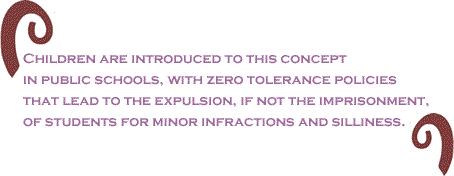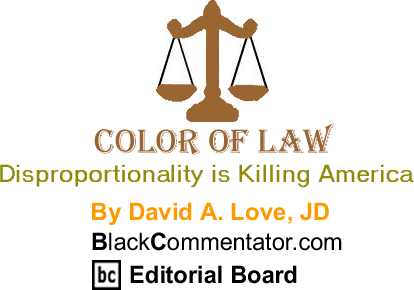
|
||||||||||||||||||||||
|
||||
 |
||||
| The word disproportionality has been on my mind a great deal lately.� The definition of disproportionality is the state of lacking symmetry or proportion; of being out of proportion, as in size, shape or amount; of being unequal.� In order to better understand the concept of disproportionality, consider a punishment of ten years� imprisonment for littering.� Now that�s out of whack.� That�s disproportionality. Unfortunately, when you look around you at life in the United States, at the culture and the politics of the place, this country is rife with disproportionality.� And it seems as is if this dysfunctional state of affairs has been normalized.� Children are introduced to this concept in public schools, with zero tolerance policies that lead to the expulsion, if not the imprisonment, of students for minor infractions and silliness.� At the same time, troubled youth� lacking outlets, encouragement, self-esteem, and a person who will listen� have not learned conflict resolution skills.� Their approach is to react to all arguments and perceived disses through acts of violence, you know, just like nations do. America�s criminal justice system certainly is disproportional.� In the land of the free, 5 percent of the world�s population boasts 25 percent of the world�s prisoners.� Bad drug laws and sentencing guidelines fill the prison cells with nonviolent offenders.� The vast majority of these prisoners are black and Latino, not to mention poor and uneducated.� The vast majority of the judges and lawyers are white.� And not only are these poor black and Latino inmates warehoused in rural white districts, they are counted in the population of those districts, thereby benefiting those areas.� In the days of the Great Recession, state governments are smothered by the prison boom, as corrections spending competes with education and social welfare, and aims to win.� Disproportionality reigns supreme in our economic, social and political systems.� In America, guns are in abundance, while millions of people cannot find a job or afford to keep their home.� There is a right to own a weapon, but no right to employment or shelter.� Such is the state of affairs in a banana republic such as the United States, equally bankrupt in finances and ethics.� And a small group of people have all of the money, or most of it, at least, with the top 1 percent owning 42 percent of the wealth.� Corporations are people, too, with just as much freedom of speech as the average human being, and just as much of a right to pour millions of dollars into a political campaign.� Banks destroyed that artifact once called the American middle class, yet were rewarded for their failure and greed with a bailout.� We were told the perpetrators needed that money, or else the entire economic system would have collapsed.� But where is the bailout for the victims?������ These days, the U.S. Senate is one of the more blatant examples of pure disproportionality in action.� In this august body, great ideas find their final resting place, and laws are sold to the highest bidder.� Under Senate rules, the minority has the power to control the game, although they lost the election.� An individual senator can become king or queen for a day, a petty dictator with the power to shut down the entire joint by simply blocking the body�s ability to vote.� One person�whether through a manifestation of greed, vanity, cruelty, ignorance, mental instability, or other�can deny a million people an extension to their unemployment benefits, furlough thousands of federal workers, block a White House nominee, or shoot down crucial health care or financial reform.� These are things of which crumbling empires are made.���
Disproportionality from within, disproportionality from without.� A nation that is supposedly broke has adequate resources to fight two unnecessary wars in Iraq and Afghanistan, and accounts for 41.5% of the world�s military expenditures.� America maintains military bases in many countries, including wealthy and technologically advanced countries such as Germany, Japan and South Korea.� And as their children are groomed for a high-tech world of computers, millions of America�s children are hungry, undereducated, and groomed for a life behind bars.� And yet, the U.S. has to protect these nations because they are vulnerable? Am I the only one who is concerned here?� Perhaps I�m just blowing all of this out of proportion. BlackCommentator.com Editorial Board member, David A. Love, JD is a journalist and human rights advocate based in Philadelphia, and a contributor to The Huffington Post, theGrio, The Progressive Media Project, McClatchy-Tribune News Service, In These Times and Philadelphia Independent Media Center. He also blogs at davidalove.com, NewsOne, Daily Kos, and Open Salon. Click here to contact Mr. Love. |
||||
 |
||||
If you would like to comment on this article, please do so below. There is a 400 character limit. You do not need a FaceBook account. Your comment will be posted here on BC instantly. Thanks. Entering your email address is not mandatory. You may also choose to enter only your first name and your location.
|
||||
Thank you very much for your readership. |
||||
| Any BlackCommentator.com article may be re-printed so long as it is re-printed in its entirety and full credit given to the author and www.BlackCommentator.com. If the re-print is on the Internet we additionally request a link back to the original piece on our Website. | ||||
| |
||||
March 4, 2010 |
| Executive Editor: Bill Fletcher, Jr. |
| Managing Editor: Nancy Littlefield |
| Publisher: Peter Gamble |
| Est. April 5, 2002 |
| Printer Friendly Version in resizeable plain text format |
 |
 |
 |

|
 |
| |
| |

































 �
�









